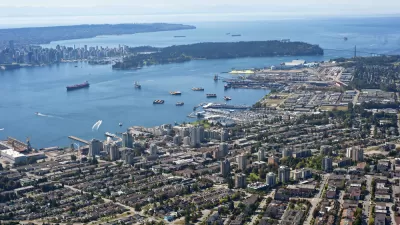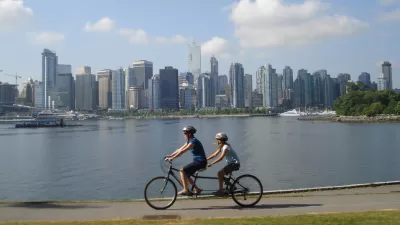The trends in the Vancouver housing market have reverted back to normal, after a foreign buyers tax that went into effect in 2016 had an initial effect on parts of the market.

"Metro Vancouver's housing market hasn't substantially improved since a regional 15 per cent foreign buyers tax was implemented in August 2016," reports Justin McElroy. The analysis stands in contrast to initial reports after the new foreign buyers tax went into effect last year.
McElroy is providing analysis of data provided by the Real Estate Board of Greater Vancouver, with commentary provided by a pair of professors from the University of British Columbia's Sauder School of Business.
The analysis takes a wide-ranging approach to the data—from home prices (which have crept back up to pre-foreign buyers tax after an initial drop) to apartment prices (which have been consistently growing, despite the tax), suburban prices (where apartment and house prices paused briefly after the law went into effect, but then continued to rise steadily), housing activity (up significantly over 2016), and foreign buyers (increasing steadily after an initial drop following the new tax).
The data seem to make a case that the foreign buyers tax did not solve the fundamental problems of the Vancouver housing market—a case that has also been made this year by Dan Bertolet. In McElroy's article, Tsur Sommerville, a professor at UBC's Sauder School of Business, cautions against over-interpreting the data, but also suggests that Vancouver policy makers might need to target more effective taxes to have an effect on the housing market.
FULL STORY: 5 charts showing Metro Vancouver's affordability has become worse despite the foreign buyers tax

Alabama: Trump Terminates Settlements for Black Communities Harmed By Raw Sewage
Trump deemed the landmark civil rights agreement “illegal DEI and environmental justice policy.”

Planetizen Federal Action Tracker
A weekly monitor of how Trump’s orders and actions are impacting planners and planning in America.

The 120 Year Old Tiny Home Villages That Sheltered San Francisco’s Earthquake Refugees
More than a century ago, San Francisco mobilized to house thousands of residents displaced by the 1906 earthquake. Could their strategy offer a model for the present?

In Both Crashes and Crime, Public Transportation is Far Safer than Driving
Contrary to popular assumptions, public transportation has far lower crash and crime rates than automobile travel. For safer communities, improve and encourage transit travel.

Report: Zoning Reforms Should Complement Nashville’s Ambitious Transit Plan
Without reform, restrictive zoning codes will limit the impact of the city’s planned transit expansion and could exclude some of the residents who depend on transit the most.

Judge Orders Release of Frozen IRA, IIJA Funding
The decision is a victory for environmental groups who charged that freezing funds for critical infrastructure and disaster response programs caused “real and irreparable harm” to communities.
Urban Design for Planners 1: Software Tools
This six-course series explores essential urban design concepts using open source software and equips planners with the tools they need to participate fully in the urban design process.
Planning for Universal Design
Learn the tools for implementing Universal Design in planning regulations.
Clanton & Associates, Inc.
Jessamine County Fiscal Court
Institute for Housing and Urban Development Studies (IHS)
City of Grandview
Harvard GSD Executive Education
Toledo-Lucas County Plan Commissions
Salt Lake City
NYU Wagner Graduate School of Public Service





























